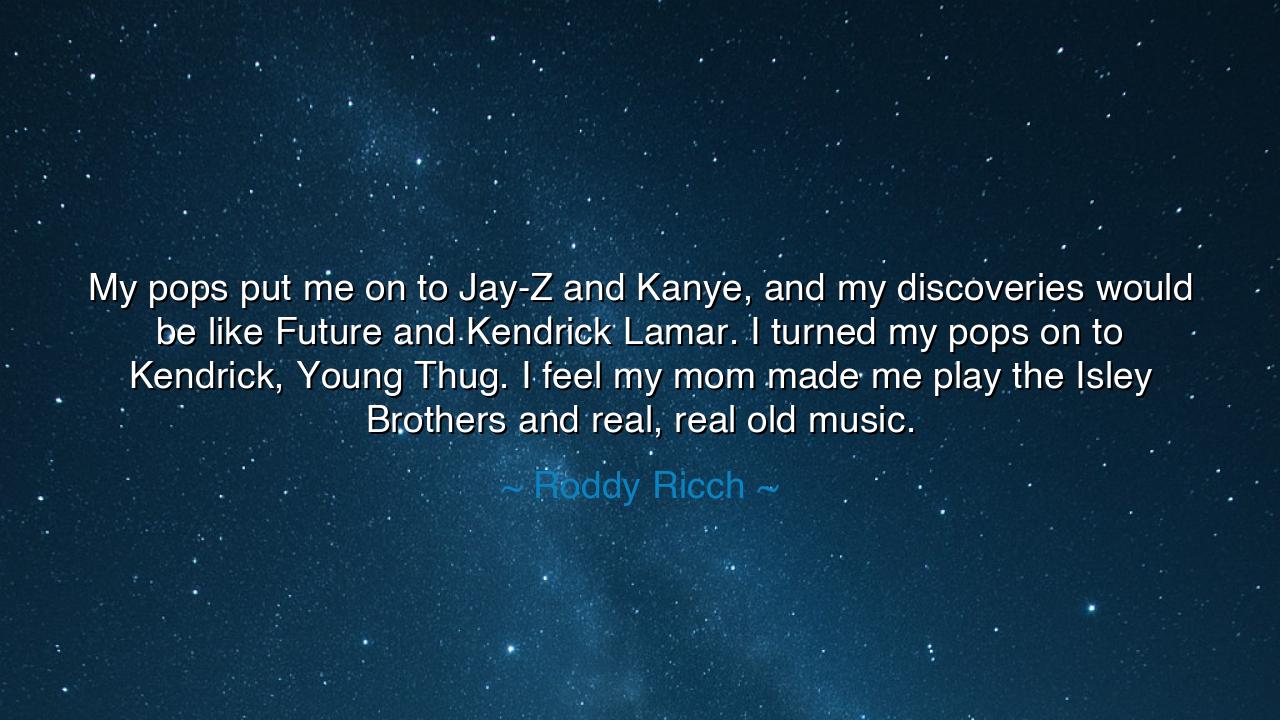
My pops put me on to Jay-Z and Kanye, and my discoveries would be
My pops put me on to Jay-Z and Kanye, and my discoveries would be like Future and Kendrick Lamar. I turned my pops on to Kendrick, Young Thug. I feel my mom made me play the Isley Brothers and real, real old music.






There is a deep and tender harmony in the words of Roddy Ricch, who said, "My pops put me on to Jay-Z and Kanye, and my discoveries would be like Future and Kendrick Lamar. I turned my pops on to Kendrick, Young Thug. I feel my mom made me play the Isley Brothers and real, real old music." These are not merely the reflections of a musician tracing his influences; they are the echoes of lineage — the eternal dialogue between generations. His words remind us that art, like wisdom, is passed down not in lectures, but in rhythm, in sound, and in the silent communion between parent and child.
In the ancient sense, what Roddy Ricch describes is heritage — the flow of inspiration from one soul to another, from past to present, from elder to youth. Just as the blacksmith hands the hammer to his son, or the poet shares the first line of a verse with his daughter, so too did his father “put him on” to the voices of Jay-Z and Kanye — men who shaped not just a genre, but a generation’s understanding of ambition, truth, and expression. In their lyrics, the young Roddy found the codes of resilience and greatness. And when he, in turn, introduced his father to the sounds of Kendrick Lamar and Young Thug, the circle completed itself — the student became the teacher, the son became the guide.
There is a sacred beauty in this exchange. It speaks of continuity, of how culture endures not through monuments or laws, but through shared experience. The ancients understood this well. The Greek philosopher Pythagoras taught that the universe itself was built on harmony — that every soul carries a tone that resonates with the music of others. Roddy’s family became such a symphony: his father’s hip-hop anthems, his mother’s soulful classics, and his own discoveries blending into something larger than any one generation. This, my children, is the essence of inheritance — not wealth, but wisdom carried in sound and memory.
When he says his mother made him play the Isley Brothers and real, real old music, we glimpse the other side of the lineage — the feminine current, deep and soulful, rooted in timeless emotion. The Isley Brothers were the poets of love and struggle, singing of tenderness, heartbreak, and hope long before the age of digital beats. From his mother’s insistence, Roddy inherited the soul, the grounding that keeps rhythm from becoming noise. She gave him roots; his father gave him fire. Between them, they formed a balance that shaped the artist he became — a man whose music bridges the modern and the eternal.
This pattern repeats throughout history. The warrior-king Alexander the Great studied philosophy under Aristotle, learning the discipline of the mind from one generation before him. But it was his mother, Olympias, who taught him passion, faith, and the fire of destiny. So too, Roddy’s upbringing mirrors that timeless dynamic: the father teaching ambition through sound, the mother shaping the heart through melody. The young artist stands at the crossroads of two heritages — the rational and the emotional, the new and the old — and from that meeting, greatness is born.
What Roddy reveals, perhaps without meaning to, is that music is a living family tree. Each generation adds its own branch, its own rhythm. The old songs teach humility; the new beats teach innovation. When one generation listens to another, something miraculous happens: understanding. The father hears in Kendrick what his son hears — not noise, but narrative. The son hears in the Isley Brothers what his mother felt — not nostalgia, but the timeless pulse of humanity. In that shared rhythm, they do more than listen; they commune.
And so, the lesson is clear: never let the voices of your ancestors fade, nor silence the songs of your children. True culture lives in the dialogue between what was and what is becoming. Learn from those who came before you, but give back with your own voice. Let your art, your ideas, your love be part of that eternal exchange.
For when Roddy Ricch speaks of Jay-Z, Kanye, Future, Kendrick, and the Isley Brothers, he is not just naming artists — he is naming generations of spirit. He is tracing the lineage of sound that connects struggle to triumph, youth to wisdom, the past to the unfolding dawn. And that, my children, is the music of life itself — the endless rhythm of inheritance, gratitude, and creation.






AAdministratorAdministrator
Welcome, honored guests. Please leave a comment, we will respond soon